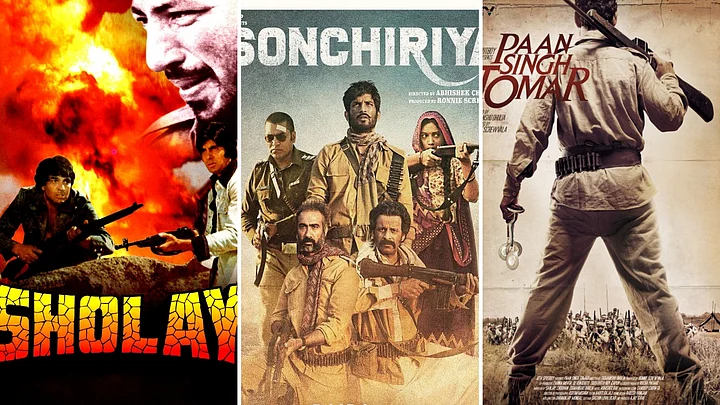This Friday, 1 March, sees the release of Abhishek Chaubey’s Sonchiriya starring Sushant Singh Rajput, Bhumi Pednekar and Manoj Bajpayee. The film is a period drama set in the ravines of Chambal and deals with a group of rag-tag baaghis, or as the rest of the world likes to call them, daakus. Sonchiriya revives the dacoit drama which saw its heyday in the 60s and 70s but seems to have lost favour post the 90s.
There was a time when Bollywood was obsessed with bandits and dacoits. The dusty settings, the guns and glory, the twisted code of honour made the genre India’s answer to Hollywood Westerns. A dacoit was anything the filmmaker wanted him (or her) to be: a perfect villain terrorizing innocent town folk or a vigilante anti-hero taking justice into his (or her) own hands.
Recently, we have seen Hindi-heartland gangster dramas like Gangs of Wasseypur and Mirzapur that have reclaimed the setting and action of dacoit films while adding a ton of modern swagger. Sonchiriya, however, feels like a purer reboot of the genre, going to back to the basics.
So let us do the same and look back at some of the landmark daaku movies in Bollywood history.
Sholay (1975)
The big daddy of all on-screen daakus is the legendary Gabbar Singh, one of the greatest villains in Bollywood history. While Sholay is a bonafide classic featuring stars like Amitabh Bachchan, Dharmendra, Sanjeev Kumar and Hema Malini, it is bad guy Gabbar played by Amjad Khan who steals the show. The part is so iconic that Amitabh wanted to play it instead of the lead, a wish he unfortunately made true in the horrendous preudo-remake Aag. Sholay borrows heavily from westerns and samurai epics, to the point that it even coined the term ‘curry western.’
Gunga Jumna (1961)
Nitin Bose’ Gunga Jumna is probably the defining dacoit film of Bollywood, the first of its kind and inspiring countless others. The film stars Dilip Kumar in one of his greatest performances along with Vyjayanthimala and Nasir Khan. It was also written, produced and supposedly ghost-directed by Dilip. Gunga Jamuna is a landmark film due to its rustic authenticity, sympathetic portrayal of bandits, and archetypical story of brothers on either side of the law. It is cited as a major inspiration by screenwriters Salim-Javed. Naushad’s music is an all time classic and the film won many Indian as well as international awards.
Bandit Queen (1994)
Shekhar Kapur’s Bandit Queen was a hugely controversial film at the time of its release, but remains a hard-hitting biopic of a remarkable woman. The true story stars Seema Biswas as Phoolan, a woman from a small village in Uttar Pradesh who is constantly oppressed due to her lower caste. A final humiliation comes in the form of a group of dacoits who abduct and publicly assault her. Phoolan swears revenge and manages to form her own deadly gang, becoming known and feared as Phoolan Devi, the Bandit Queen. Phoolan was a contentious public figure, and went on to become a member of parliament after the film’s release.
China Gate (1998)
Rajkumar Santoshi’s China Gate is in many ways a spiritual remake of Sholay. The film is heavily inspired by Seven Samurai which in turn was the main inspiration for Ramesh Sippy’s 1975 blockbuster. In the high point of 90s action films where one man could take down an entire army, China Gate made the sombre choice of pitting a team of middle-aged aged veterans against its dreaded bandit, Jageera. The cast feature heavy hitters like Om Puri, Naseeruddin Shah, Amrish Puri and Danny Denzongpa. While Mukesh Tiwari’s Jageera may not be as iconic as Gabbar Singh, 90s kids still remember the line “Mere mann ko bhaaya, main kutta kaat ke khaaya!”
Paan Singh Tomar (2012)
Tigmanshu Dhulia’s Paan Singh Tomar is the second biopic on this list, based on the real life story of the titular soldier and athlete who resorted to a life of crime after losing his property. Paan Singh served in the India army, became a steeplechase champion for the country at the Asian Games, yet found no support from the country after his retirement. He took up the gun as a bandit and later lost his life in a shootout with the police. It’s a tragic story, and Irrfan Khan plays the part with a raw physicality. The cast also includes Nawazuddin Siddiqui, Mahie Gill and Vipin Sharma.
(At The Quint, we question everything. Play an active role in shaping our journalism by becoming a member today.)
